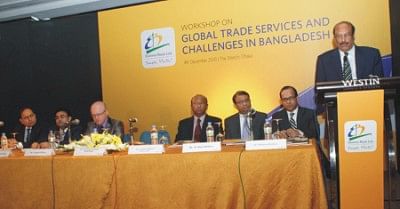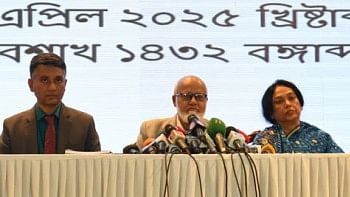Business leaders underline trade services

Central bank deputy chief Ziaul Hasan Siddiqui speaks at a workshop on “Global Trade Services and Challenges in Bangladesh” organised by Eastern Bank at Westin Dhaka hotel yesterday. Vice-president of ICC-Bangladesh Latifur Rahman was also present. Photo: EBL
Bangladesh needs to understand the global trade challenges better through right platforms and developing knowledge and skills as the country's economy continues to open up, business leaders and bankers said yesterday.
Speakers made the remarks at the inaugural of a daylong workshop titled 'Global Trade Services and Challenges in Bangladesh' held at The Westin Dhaka Hotel.
Eastern Bank organised the event, chaired by its Managing Director and Chief Executive Officer Ali Reza Iftekhar.
Speaking as the chief guest, Ziaul Hasan Siddiqui, deputy governor of Bangladesh Bank, reiterated that the issue of global trade services is emerging as “very important” for Bangladesh.
“The opening of the economy is happening quite fast,” he said pointing to the country's export and import figures, which stand at $16 billion and $24 billion respectively.
He said in terms of gross domestic product (GDP), which is currently $100 billion, 40 percent of the economy is open now. “From that point of view this (global trade services) is very important.”
Siddiqui said the central bank is now undergoing a series of reforms to help Bangladesh achieve 8 percent economic growth.
“International bodies have absolutely agreed with us that in the next two years, it will be possible for Bangladesh to achi-eve its higher growth trajectory at 8 percent from the current around 6 percent.
“With the envisaged changes following the reforms, it will not be difficult for us to attain 8 percent growth rate as the economy will open further by then. So, learning about the global trade challenges should be very, very important for us,” he said.
The central bank official said Bang-ladesh backed by the required efforts could achieve the growth targeted.
“Goldman Sachs has said Bang-ladesh would be in the Next-11, whereas JP Morgan said that the country will be in Frontier-5. We are really in a position to reach that target. We just need a little more effort,” he said.
Siddiqui said Bangladesh's growth success is not confined to any particular sector; rather it is due to all-inclusive growth. “It is not that we are only aiming at the industrial sector. We are looking at the financial inclusion.”
“There is microfinance to reach the bottom part of the population. Now we are emphasising on the SMEs (Small and Medium Enterprises). As a result, the whole economy is growing. We are also trying to ensure that the disparity between the richest and the poorest does not widen and thereby spark off any social unrest.”
Latifur Rahman, vice-president of International Chamber of Commerce-Bangladesh, said the global trade services are becoming more and more important part of our daily lives.
“With Bangladesh entering the world of exports more aggressively and more successfully year after year, the need for accessing informed knowledge of the global trade services is important.”
He said without in-depth knowledge of the global trade services, the country would not be able to meet the challenges emerging.
Ali Reza Iftekhar said Bangladesh is now a widely talked about country among the emerging countries and its economy has been constantly growing through the last two decades.
Goldman Sachs considers it among the Next-11 after BRIC (Brazil, Russia, India and China) economies, and JP Morgan puts Bangladesh among the Frontier-5 based on the relative market attractiveness, he said.
“Apparel exports grew by 37 percent in the last quarter. Bangladesh is attracting large international buyers in increased numbers.”
“To play even bigger role in the international trade in the coming years, we need to get ready and have right platform and develop our knowledge and skill bases,” the EBL chief said.
Vincent O'Brien, first director of eBSI Dublin, Ireland and member of ICC Commission on Banking Techniques & Practice, and EBL Deputy Managing Director Muklesur Rahman also spoke.
Shah Md Ahsan Habib, director of Bangladesh Institute of Bank Mana-gement, was present among others.
Representatives from various banks, financial institutions and corporate houses took part in the workshop.

 For all latest news, follow The Daily Star's Google News channel.
For all latest news, follow The Daily Star's Google News channel. 



Comments